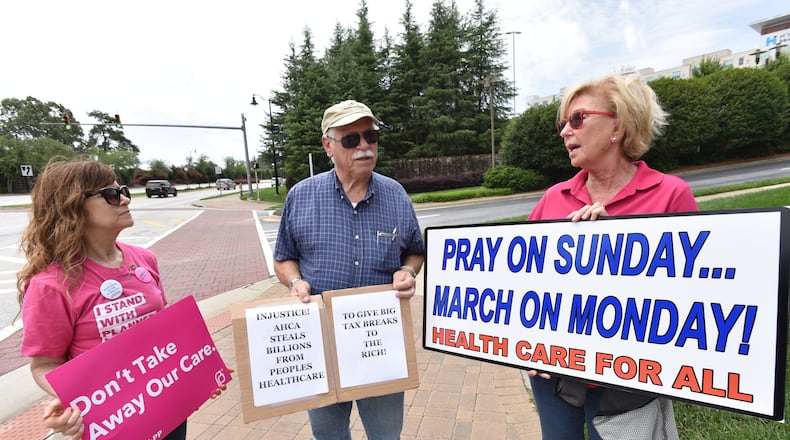After the U.S. Senate finally revealed its proposed federal health care bill, advocates revved up their rhetoric with extreme positions, loud cheers and denunciations.
“INJUSTICE!” blared the handmade sign of a protester Friday outside U.S. Sen. Johnny Isakson’s office. The Senate’s bill “is morally repugnant,” said the man holding the sign, Michael Blundell of Paulding County, a retired energy analyst who favors a single-payer system like some European countries have.
Diametrically opposed to Blundell were advocates for the bill such as President Donald Trump. Trump tweeted his strong support to 33 million followers Thursday night, adding, “Remember, ObamaCare is dead.”
They’re strong words for big actions.
House Republicans in May defied expectations to pass their rollback of the Affordable Care Act, the federal health care law known as Obamacare. On Thursday, Senate Republicans revealed a draft of their version, and Senate GOP leaders hope it will come to a vote next week. It’s a tight schedule and they don’t yet have the votes — a fifth Republican senator came out in opposition on Friday, and the party can at the most lose two for the plan to pass. But it’s an ambitious effort: Both pieces of legislation would make deep cuts to Medicaid, the federal program for the poor, as well as gut Obamacare’s basic requirements and funding. The rhetoric is fever pitch.
But in truth, most Americans do not view health care through such a polarized lens or in such black-and-white terms. Poll after poll has shown that Americans are generally unhappy with the current system, but a majority want it fixed, not dead. The latest poll commissioned by The Atlanta Journal-Constitution surveyed residents of the 6th Congressional District, a historically Republican district, and found 62 percent of respondents had an unfavorable view of the House GOP's replacement bill for Obamacare.
What they did stand united in opposing was the rising costs of health care, which the Obamacare law has been unequipped to control. Ninety-four percent of the AJC poll's respondents were concerned about health care costs. Nearly three-quarters of those polled were very concerned.
That tracks with the views of Mark Fairchild. He happens to works in the same office building where Isakson has his offices. He was taking a walk for lunch when he ran into the clutch of protesters Friday on Cumberland Boulevard, and he passed them with mild interest. He calls himself a conservative.
“I know they want to change Obamacare. I think it needs to be changed,” he said, citing the diminishing number of insurance companies on the exchange. Asked whether lower-income patients’ premiums should be subsidized, he leans to no, though not as a bomb-thrower: “That’s a tough one,” he said.
Fairchild, however, said he supports some Obamacare mandates, such as the requirement that plans accept children on parents’ plans up to age 26 and that pre-existing conditions be covered.
Those are in the Senate version, and he’s glad. Like most people, Fairchild isn’t schooled on the details of the Senate plan, but he knows enough to know it should be amended.
“I think it doesn’t need to be rushed through. One of the biggest problems in D.C. is it’s gotten so partisan. … They all work for the people. At some point they need to work for the people and put the partisanship aside.”
Candy David, who works in commercial flooring purchasing, voted for Republican Karen Handel in this week’s congressional election. But she liked her Obamacare plan from last year. That insurance company, however, dropped out of the exchange market, and this year she doesn’t like her new plan. In short, the prices are too expensive. Put her in the very, very concerned category for health care costs.
She recently slipped and fell and got three scans, at a cost of $11,000. She still doesn’t know what her share will be or how much her premiums will continue to rise even if Obamacare stays the same.
“I think it’s a big ripoff, a lot of it,” she said. “I’m afraid what it’s going to be next year.”
She’d just like the health insurance market to be stabilized so that companies wouldn’t drop out and they can offer truly affordable prices on premiums, deductibles and co-pays. She doesn’t think people should be forced to buy insurance (though getting healthy people in with the unhealthy ones makes it affordable). But if they do, she thinks it should be subsidized for lower-income people so it’s affordable.
Whatever happens, she said, Congress shouldn’t be afraid to fix what’s wrong and shouldn’t act from partisan motives.
“No,” she said, “just work together and try to make it right.”
HEALTH CARE COVERAGE
Health care is a huge issue nationally and in Georgia. To see more stories about it, follow our coverage at http://www.myAJC.com/politics.
About the Author
Keep Reading
The Latest
Featured




